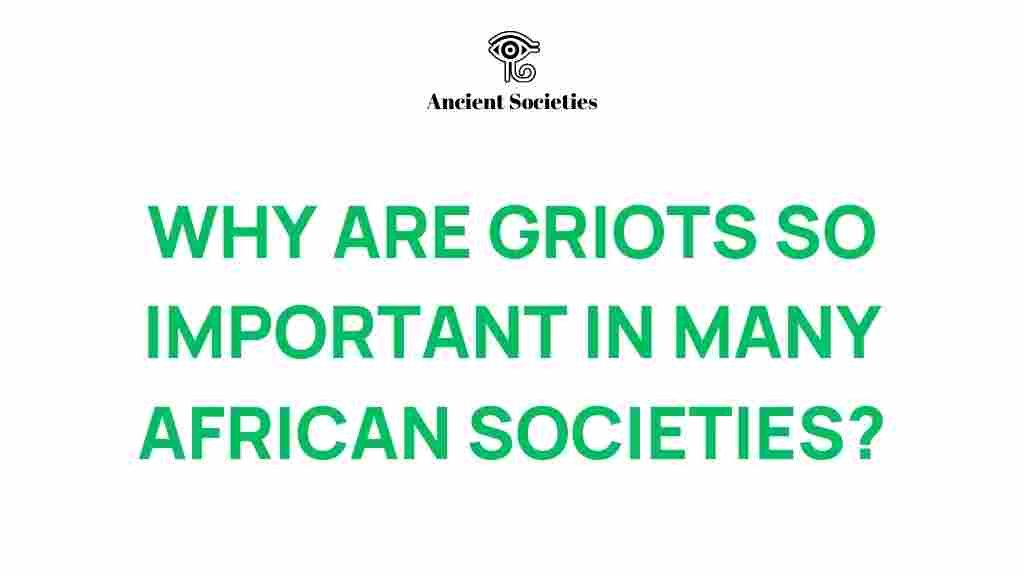The Vital Role of Griots: Guardians of African Heritage
In the rich tapestry of African culture, few figures are as revered as the griots. These storytellers play a critical role in preserving the oral tradition, sharing history, and maintaining community identity. Griots are not just entertainers; they are the custodians of collective memory, weaving tales of ancestors, legends, and the culture that binds communities together. In this article, we will explore the multifaceted roles of griots, their significance in African heritage, and how they continue to influence contemporary society.
Understanding the Role of Griots
Griots, often referred to as storytellers, musicians, and historians, fulfill several vital functions in their communities. Their roles include:
- Preserving History: Griots are responsible for passing down the oral history of their people, ensuring that the legacy of generations is not forgotten.
- Maintaining Heritage: Through songs, stories, and performances, they keep cultural traditions alive, fostering a sense of belonging and identity.
- Educating Communities: Griots educate through storytelling, imparting moral lessons and cultural values to younger generations.
- Celebrating Events: They participate in important ceremonies, such as weddings and funerals, marking significant life events with their art.
- Acting as Mediators: Griots often serve as peacekeepers, using their influence to resolve conflicts within the community.
The Oral Tradition: A Cornerstone of African Culture
The oral tradition is a cornerstone of African culture, with griots at the heart of this practice. Unlike written records, oral history relies on the spoken word to convey stories, knowledge, and values. This tradition is characterized by:
- Storytelling Techniques: Griots use various techniques, such as rhythm, repetition, and dramatic expression, to engage their audience and make stories memorable.
- Musical Accompaniment: Music plays an essential role, with griots often using instruments like the kora, balafon, and ngoni to enhance their storytelling.
- Community Participation: Storytelling is often a communal activity, with audience members encouraged to respond and interact, creating a shared experience.
The Historical Significance of Griots
Throughout history, griots have served as the memory keepers of African societies. They have played a crucial role in:
- Documenting Historical Events: Griots recount significant events, battles, and the lives of important figures, providing insight into the past.
- Preserving Languages: By passing down stories, they help to maintain indigenous languages, some of which are at risk of extinction.
- Connecting Generations: Griots bridge the gap between the past and the present, ensuring that younger generations understand their roots.
As custodians of history, griots contribute to the identity of their communities, reinforcing the idea that understanding one’s past is vital for shaping the future.
Community and Identity: The Heart of Griot Culture
The community aspect of griot culture cannot be overstated. Griots are deeply embedded in the social fabric of their communities, and their work helps to:
- Foster Unity: By celebrating shared history and culture, griots help to create a sense of belonging among community members.
- Strengthen Identity: Griots contribute to the formation of cultural identities, allowing communities to express who they are through their stories.
- Encourage Participation: Community members often participate in storytelling events, which fosters a sense of involvement and ownership of their culture.
In this way, griots are not just individual artists; they are vital links in the chain of cultural transmission, ensuring that identity and heritage are preserved for future generations.
Modern Challenges Faced by Griots
Despite their significant role, griots face several modern challenges, including:
- Globalization: The influence of global media and technology can overshadow traditional storytelling practices, making it challenging for griots to maintain their art.
- Economic Pressures: Many griots struggle financially, as their art is often undervalued in contemporary society.
- Changing Cultural Dynamics: As communities evolve, the role of griots may change, leading to a potential loss of traditional practices.
Addressing these challenges requires support from both local communities and global audiences who appreciate the importance of griots in preserving African culture.
Preserving the Art of Storytelling: A Step-by-Step Guide
For those interested in supporting the preservation of oral tradition and the role of griots, consider the following steps:
- Engage with Local Griots: Attend storytelling events or community gatherings where griots perform. This supports their work and helps keep the tradition alive.
- Promote Awareness: Share information about the role of griots in African culture through social media or community events.
- Support Cultural Organizations: Contribute to organizations that promote and support the arts and oral traditions in Africa.
- Document Stories: Encourage the recording of stories told by griots, whether through audio, video, or written formats, to preserve them for future generations.
- Incorporate Griot Art into Education: Advocate for the inclusion of griot storytelling in educational curricula to teach young people about their heritage.
Troubleshooting Common Issues with Griot Preservation
While supporting griots and their storytelling tradition, you may encounter some challenges. Here are some common issues and solutions:
- Lack of Engagement: If community members are not participating, consider hosting workshops or interactive storytelling sessions to spark interest.
- Funding Challenges: Collaborate with local businesses or cultural institutions to seek sponsorships or grants to support griot events.
- Cultural Misunderstanding: Promote cultural exchange programs that allow for greater understanding of the importance of griots in their communities.
Conclusion: Celebrating Griots and Their Legacy
The role of griots as guardians of African heritage is invaluable. Through their oral tradition, they preserve the history, music, and identity of their communities, ensuring that the rich cultural tapestry of Africa continues to thrive. By engaging with and supporting griots, we contribute to the lasting legacy of African culture and the importance of storytelling in our shared human experience. To learn more about this vital tradition, visit this resource for in-depth information.
In a world that often overlooks the significance of oral histories, let us celebrate the griots and their essential role in maintaining the threads of our collective identity.
This article is in the category Culture and created by AncientSocieties Team
